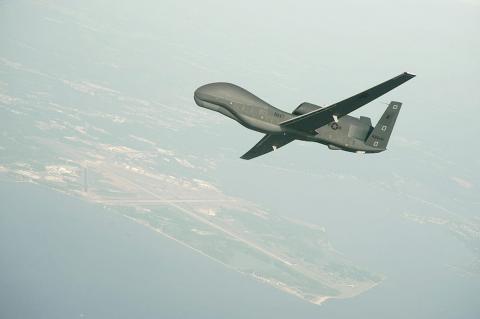The US will use its most advanced unmanned reconnaissance aircraft to monitor Chinese activity in waters surrounding the Diaoyutai Islands (釣魚台), the object of an acrimonious dispute between Beijing and Tokyo, Japanese media are reporting.
The decision was made during a meeting between Japanese Defense Minister Satoshi Morimoto and US Secretary of Defense Leon Panetta at the Pentagon on Sunday, NHK and the Yomiuri Shimbun said, adding that the drones would also conduct surveillance around Okinawa.
At least three unarmed Northrop Grumman RQ-4 Global Hawk drones have been deployed at Andersen Air Force Base on Guam since September 2010, bolstering the operational intelligence capabilities of US forces in the Asia-Pacific.

Photo: Reuters
Operating at an altitude of about 18,000m, the RQ-4 provides near-real-time, long-range intelligence, surveillance and reconnaissance imagery by means of a high-resolution synthetic aperture radar. It played a role in damage assessment following the disaster at Japan’s Fukushima Dai-ichi nuclear power plant in March last year.
Amid rising tensions between Japan and China over the disputed islets, the Japan Maritime Self-Defense Force has mostly relied on P-3C “Orion” surveillance aircraft to monitor Chinese naval activity in the area.
Taiwan also claims sovereignty over the islands.
Tetsuo Kotani, a fellow at The Japan Institute of International Affairs in Tokyo, said the deployment sends an important message.
“One of the urgent issues for the US-Japan alliance is to enhance intelligence, surveillance and reconnaissance [ISR] cooperation,” he told the Taipei Times yesterday. “The Global Hawk can serve as a symbol of allied ISR cooperation.”
“This is an important step for the alliance and sends a strong message to Beijing that Washington stands firmly with Tokyo,” he said.
Although the US does not officially take a position on the sovereignty dispute, some believe the Diaoyutais fall within the scope of Article 5 of the US-Japan Treaty of Mutual Co-operation and Security.
However, Kotani said Beijing should not misunderstand the real message.
“This is US reassurance to Japan. As long as Japan is reassured by the US, Japan does not have to take provocative actions vis-a-vis Beijing over the Senkakus,” he said. “No country wants to increase the tensions.”
The Diaoyutais are known as the Senkaku Islands in Japan.
During Sunday’s meeting, Panetta and Morimoto also agreed to explore eventual revisions of the Guidelines for Japan-US Defense Cooperation, which govern cooperation between the Japan Self-Defense Forces and the US military during crises.
Passed in 1978, the guidelines were substantially revised in 1997 in response to the North Korean nuclear program.
“We shared the view that it’s important to jointly study and discuss [security matters], taking into consideration changes in the security environment and what Japan-US cooperation should be,” Morimoto told a press conference.
According to the Yomiuri Shimbun, the review will focus on defense cooperation on the Nansei Islands in response to Chinese military expansion and increasing activity in waters surrounding Japan, as well as North Korea’s nuclear and missile development and post-disaster cooperation.
No specific procedures or timeline for the review were discussed.

Intelligence agents have recorded 510,000 instances of “controversial information” being spread online by the Chinese Communist Party (CCP) so far this year, the National Security Bureau (NSB) said in a report yesterday, as it warned of artificial intelligence (AI) being employed to generate destabilizing misinformation. The bureau submitted a written report to the Legislative Yuan in preparation for National Security Bureau Director-General Tsai Ming-yen’s (蔡明彥) appearance before the Foreign Affairs and National Defense Committee today. The CCP has been using cognitive warfare to divide Taiwanese society by commenting on controversial issues such as Taiwan Semiconductor Manufacturing Co’s (TSMC, 台積電) investments in the

HELPING HAND: The steering committee of the National Stabilization Fund is expected to hold a meeting to discuss how and when to utilize the fund to help buffer the sell-off The TAIEX plunged 2,065.87 points, or 9.7 percent, to close at 19,232.35 yesterday, the highest single-day percentage loss on record, as investors braced for US President Donald Trump’s tariffs after an extended holiday weekend. Amid the pessimistic atmosphere, 945 listed companies led by large-cap stocks — including Taiwan Semiconductor Manufacturing Co (TSMC, 台積電), Hon Hai Precision Industry Co (鴻海精密) and Largan Precision Co (大立光) — fell by the daily maximum of 10 percent at the close, Taiwan Stock Exchange data showed. The number of listed companies ending limit-down set a new record, the exchange said. The TAIEX plunged by daily maxiumu in just

‘COMPREHENSIVE PLAN’: Lin Chia-lung said that the government was ready to talk about a variety of issues, including investment in and purchases from the US The National Stabilization Fund (NSF) yesterday announced that it would step in to staunch stock market losses for the ninth time in the nation’s history. An NSF board meeting, originally scheduled for Monday next week, was moved to yesterday after stocks plummeted in the wake of US President Donald Trump’s announcement of 32 percent tariffs on Taiwan on Wednesday last week. Board members voted to support the stock market with the NT$500 billion (US$15.15 billion) fund, with injections of funds to begin as soon as today. The NSF in 2000 injected NT$120 billion to stabilize stocks, the most ever. The lowest amount it

INVESTIGATION: The case is the latest instance of a DPP figure being implicated in an espionage network accused of allegedly leaking information to Chinese intelligence Democratic Progressive Party (DPP) member Ho Jen-chieh (何仁傑) was detained and held incommunicado yesterday on suspicion of spying for China during his tenure as assistant to then-minister of foreign affairs Joseph Wu (吳釗燮). The Taipei District Prosecutors’ Office said Ho was implicated during its investigation into alleged spying activities by former Presidential Office consultant Wu Shang-yu (吳尚雨). Prosecutors said there is reason to believe Ho breached the National Security Act (國家安全法) by leaking classified Ministry of Foreign Affairs information to Chinese intelligence. Following interrogation, prosecutors petitioned the Taipei District Court to detain Ho, citing concerns over potential collusion or tampering of evidence. The